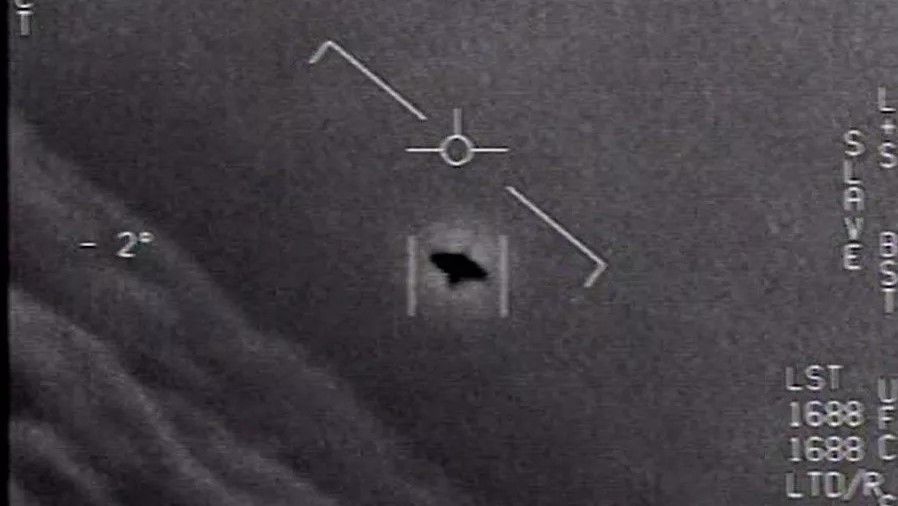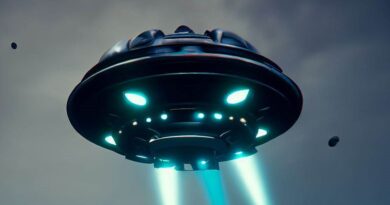Congress holding UFO hearing Tuesday: Watch it live (and what to expect)

The U.S. Congress will hold a public hearing tomorrow (May 17) on reports of unidentified aerial phenomena (UAP) skirting through our skies, and you can watch the proceedings live.
Last year, the Office of the Director of National Intelligence submitted to Congress a preliminary report regarding UAP that relayed the progress the Unidentified Aerial Phenomena Task Force has made in understanding the mysterious phenomena. (In the past few years, the term UAP has substituted for the more familiar “unidentified flying object,” or UFO.)
That helped lay the foundation for tomorrow’s hearing on UAP, which will be held under the House Intelligence Committee’s Counterterrorism, Counterintelligence, and Counterproliferation Subcommittee. The two-hour hearing starts at 9 a.m. EDT (1300 GMT); you can watch it live here at Space.com or directly via the House intelligence committee.
Tomorrow’s event comes five months after a National Defense Authorization Act required the military to establish a permanent office to gather and look into the UAP issue. That document also called for an annual report and semiannual briefings for Congress.
Related: 2022 could be a turning point in the study of UFOs
Top-tier witnesses
“The American people expect and deserve their leaders in government and intelligence to seriously evaluate and respond to any potential national security risks — especially those we do not fully understand,” lawmaker André Carson (D-Indiana), who will oversee the hearing, said in a statement last week. “Since coming to Congress, I’ve been focused on the issue of unidentified aerial phenomena as both a national security threat and an interest of great importance to the American public.”
The hearing will feature two top-tier witnesses: Ronald Moultrie, the Pentagon’s top intelligence official, and Scott Bray, Deputy Director of Naval Intelligence.
That new office to look into UAP — the Airborne Object Identification and Management Synchronization Group (AOIMSG) — was created within Moultrie’s office. Bray’s involvement makes sense, given that Navy pilots, among others, have made high-profile UAP sightings over the past two decades.
It’s Carson’s intent that the hearing “will give the American people an opportunity to learn what there is to know about these incidents.”
Related: UFO watch: 8 times the government looked for flying saucers
Wait and see
Space.com reached out to several leading UAP/UFO investigators about their expectations and views about what may take place at the hearing.
“I’m generally in a ‘wait and see’ mode with respect to the hearings. It’s great that any type of hearing on UFOs/UAPs is being held, but two hours will barely be enough to scratch the surface,” said Mark Rodeghier, the scientific director of the Center for UFO Studies.
Rodeghier said his main concern is simply whether the two officials testifying will be adequately briefed on the ongoing work of the newly formed AOIMSG. “Especially efforts by whoever is staffing and running that organization to gather data from a diverse range of government sources,” he told Space.com.
“I don’t expect any findings at this stage,” Rodeghier said, “but I would be pleased to learn about the progress being made in setting up a robust, science-based effort to investigate UFOs.”
That effort should focus on just what these aerial phenomena could be, Rodeghier said. For example, are they most likely unknown drones zipping around Navy vessels? Or might they be something more exotic, perhaps vehicles that could be tracked by sensor systems that cover space?
Nothing new?
Robert Sheaffer is a leading skeptical investigator of UFOs. He pointed out that people forget that congressional hearings on UFOs were also held 54 years ago.
“The ‘UFO experts’ paraded forth the same claims that they were already making elsewhere,” Sheaffer said about those earlier hearings. “Nobody ‘revealed’ anything, and nobody learned anything new.”
Sharing a similar view is Mick West, a debunker, skeptic, writer, UFO investigator and administrator of Metabunk.org, as well as a former video game programmer.
“I don’t anticipate much — basically a continuation of what was in the UAP report,” West said. “They will talk about setting up the AOIMSG group, establishing procedures and processes, safety issues and coordination.”
West senses that during the hearing, those testifying will be asked what’s taking so long, with the witnesses assuring the committee that things are in progress, but staffing is an issue.
“My view is that the questions that are asked in the hearing will be key,” said Robert Powell, executive board member of the Scientific Coalition for UAP Studies. “Scientific questions and answers are needed to come to a resolution as to the source of the phenomenon.”
Powell said one upshot of the hearing might be that a former Space Command official will be announced to lead the AOIMSG.
“If that rumor is true, it begs the question as to why such an individual would be put in charge of an organization if their primary concern with UAP was truly Russian and Chinese drones,” Powell said. “Exciting times.”
Related stories:
Collect and analyze data
The UFO hearing may well push the frontiers of science with government data, said Avi Loeb, head of Harvard’s Galileo Project, a systematic scientific search for evidence of extraterrestrial technological artifacts.
In an opinion piece for The Hill, a U.S. political website that covers Congress, Loeb noted that UAP has replaced UFO in the lexicon of investigators, and with that change, the observed phenomena are being viewed more as data.
“At this upcoming hearing, my sincere hope,” Loeb said, “is that the following question will be asked: Can we get the highest quality UAP data to scientists who will analyze it methodically and quantitatively?”
Loeb said that the lack of “extraordinary evidence” is often self-inflicted ignorance. “We might figure out the nature of UAP before we understand dark matter, if we would only be brave enough to collect and analyze UAP data publicly, based on the scientific method.”
In wrapping up his opinion piece, Loeb said he hopes that the U.S. government will continue to advance the scientific frontiers of our knowledge. “Future cooperation between government and science will help us understand the unknown. And exploring the unknown is the spiritual light that illuminates our journey in search for knowledge on destinations far away from the familiar rock we call Earth.”
Leonard David is author of the book “Moon Rush: The New Space Race,” published by National Geographic in May 2019. A longtime writer for Space.com, David has been reporting on the space industry for more than five decades. Follow us on Twitter @Spacedotcom or on Facebook.


